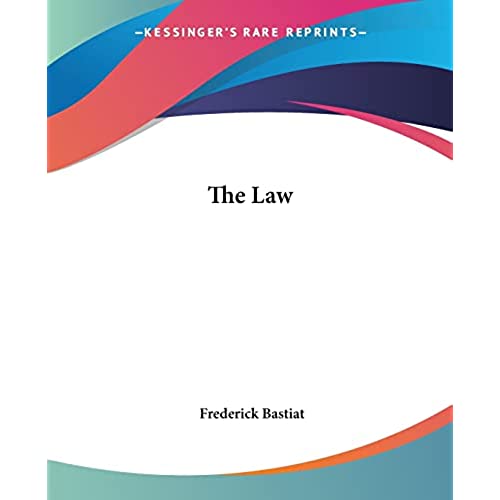

The Law
-

Christian
> 24 hourAmazing title, considered the best for me in the issues of liberty, an eye opener in the end for what it is.
-

Huck Finn
> 24 hourThe one dissenter of the philosophers of his day. Bastiat considered the periods just before, during and after the French revolution. He has a very common sense and very practical God fearing thought process to mankind and the rules we make up while sharing his respect and admiration for the ways of God, the Creator.This man will help any American to see what is true and good about the Constitution for the United States. After all, France adopted our constitution shortly after we did. ~A United States born Natural person
-

ThinkWinWin
> 24 hourIf you have no idea what Libertarianism is and would like to understand, this would be a wonderful book for you. I got my mom to read it and she loved it. Its only around 70 pages, so its really short. But there is so much philosophy in here that it will blow your mind. If I could add any one book to the high school curriculum throughout the U.S., it would be this book. The title of the book is called The Law. The title gives away the whole message. Bastiat shares his views on what the function of law should be in any society. Here is the folly that we have committed in this modern day of legislation - Here I encounter the most popular fallacy of our
-

Kindle Customer
> 24 hourThis is a short read, written a few hundred years ago, written by a guy who understood the changes he was seeing around him. Unfortunately, those same agents of change are around today. Give a copy of this to a friend who maybe sees the light, but dimly. This pamphlet can fully open his or her eyes.
-

Lexie L
> 24 hourThis book succinctly defines what law is, and what it is not. In so doing, the reader clearly sees why our present system of “laws” is not working.
-

Christina
> 24 hourPrescient book for what happened to the U.S. At the time this book was written, the author considered the U.S. one of the most just nations, but he described perfectly what happens, and did happen, when you have an increase in the size of government, and the power of the legislators to legally plunder the citizens through the laws they enact.
-

Joe
> 24 hourI have not reread it yet but I remember liking it very much. It is philosophical. It is foundational to understanding America as it was intended to be and not what lawyers have made it into.
-

Hasmig Parseghian
> 24 hourThe first 560 pages is a novel authored by L.S. The last 48 pages are written by F. Bastiat. Holding a heavy book to read only 48 pages is an unpleasant experience. 2 books in one, a distasteful joke for serious readers.
-

Barbara Bins V
> 24 hourIt is a wonderful document in history.
-

Theodore
> 24 hourI can’t believe I had never heard of and wasn’t taught this in school! Bastiat (1801-1850) laid out and explained the most fundamental and vitally important concept, that the law is simply justice, just before his prediction came true, I.e. the French Revolution. The parallels with what is happening right now in America is truly eerie! It’s as if the goals and methods that Bastiat explained about his government are identical to our current government. Reading this was like watching the Wizard of Oz when the curtain was pulled back, revealing that poor man who thought he was doing what was best. I realized that the true power of America is in our individual liberty and that protecting our liberty is the only true purpose of the law.
